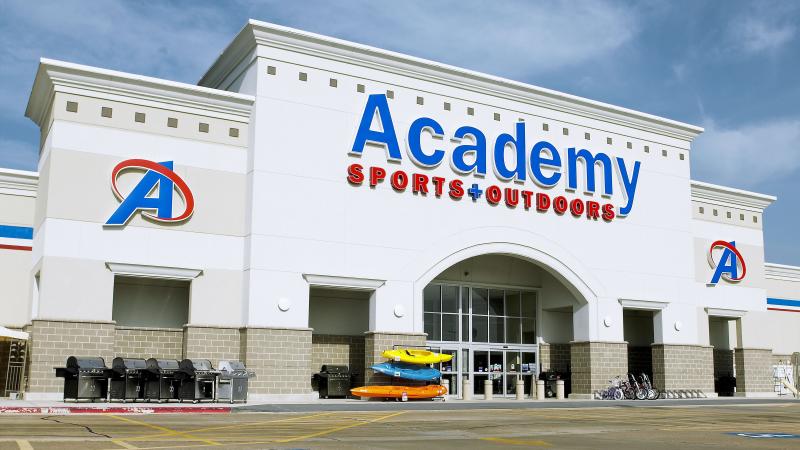Moody’s Investors Service downgraded its debt ratings for Academy Ltd. due to the “highly promotional environment” for athletic apparel and weak demand for firearms and ammunition.
Ratings impacted included the company’s Corporate Family Rating (CFR) to B3 from B2, Probability of Default Rating (PDR) to B3-PD from B2-PD, and senior secured term loan rating to B3 from B2. The ratings outlook is stable.
“The downgrades reflect our view that financial risk for Academy will remain elevated, exacerbated by difficult market conditions, including a highly promotional environment for athletic apparel and weak demand for firearms and ammunition,” according to Raya Sokolyanska, vice president and Moody’s lead analyst for the company.
Moody’s anticipates that ongoing industry challenges will offset Academy’s cost saving initiatives and the correction of its private label assortment in the second half of 2017, resulting in only a modest improvement in earnings, which remain depressed going back to the prior year. The rating agency expects leverage to decline mainly due to seasonal repayment of the company’s asset-based revolver but remain elevated at 7 times on a Moody’s-adjusted debt/EBITDA basis by year-end, compared to 7.4 times as of mid-year 2017. These metrics are equivalent to 5.3 times and 5.6 times, respectively, based on gross funded debt and management-adjusted EBITDA.
“The company’s liquidity profile is good, with ample revolver availability and an extended maturity profile serving as a buffer to an otherwise rising level of risk if operating performance does not improve over time,” added Sokolyanska.
Moody’s took the following rating actions for Academy, Ltd:
- Corporate Family Rating, downgraded to B3 from B2
- Probability of Default Rating, downgraded to B3-PD from B2-PD
- $1.825 billion ($1.689 billion outstanding) Senior Secured Term Loan B due 2022, downgraded to B3 from B2 (LGD4)
- Stable outlook
Ratings Rationale
Academy’s B3 CFR reflects the company’s high leverage and challenging conditions in the sporting goods sector. Broadened distribution of athletic apparel brands has intensified competition and increased promotional activity in Academy’s apparel business, while demand for firearms and ammunition is likely to continue declining in 2H 2017 and only modestly recover in 2018. Further, in Moody’s view, growing e-commerce penetration and the need for ongoing digital investment will continue to pressure margins. Bankruptcies and store closures among weaker players, which have resulted in heavy promotions that created pricing pressure in 2016 and early 2017, may also continue as a result of the challenging environment. The rating also incorporates the company’s geographic concentration and aggressive financial policies.
Although the operating environment will remain difficult, Moody’s expects Academy’s earnings to grow modestly in 2H 2017 and 2018 as merchandising issues roll off and cost savings materialize. Key support is also derived from Academy’s good liquidity, including modestly positive free cash flow and the ability to curtail growth investments, the lack of near-term debt maturities, ample revolver availability and a springing covenant-only capital structure. The rating also incorporates Academy’s scale, strong market position in its regions, and the relative stability of its business through recessionary periods due to its value focus and broad assortment.
The stable ratings outlook reflects Moody’s expectation that earnings will modestly improve and the company will maintain good liquidity over the next 12-18 months.
Ratings could be downgraded if liquidity deteriorates for any reason, including negative free cash flow generation and increased revolver usage. Further revenue and earnings deterioration could also lead to a downgrade. Quantitatively, the ratings could be downgraded with expectations of EBIT/interest expense (Moody’s-adjusted) below 1.0 time.
Ratings could be upgraded if the company exhibits sustained positive same-store sales and earnings growth while maintaining good liquidity. Quantitatively, an upgrade would require debt/EBITDA (Moody’s-adjusted) maintained below 6.5 times and EBIT/interest expense above 1.5 times.
In late April, Moody’s also lowered the debt ratings of the Texas-based chain to negative from stable due to recent deteriorating results. Moody’s report at the time noted that Academy’s same-store sales slid in the low-single-digit range and management-adjusted EBITDA dropped 23 percent in 2016. Sales last year reached $4.7 billion, up from $4.6 billion in 2015.
Photo courtesy Academy















